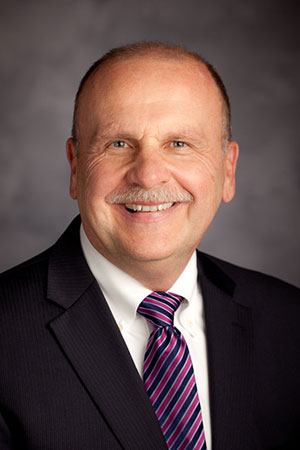By Susan N. Hanrahan, ASAHP President
In my message in the November 2017 issue, I indicated that I will be asking some of you to send a photo and answer a series of “fun” questions to be shared with our membership so that we can continue our collegiality through our newsletter. The 6th of many profiles this year is presented as follows:
Name and Title: Charles J Gulas, Dean, Walker College of Health Professions, Professor of Physical Therapy
Place of Birth: Cleveland Ohio
University: Maryville University of Saint Louis
How long have you been in your position? Started at Maryville as an adjunct in 1999, Director of Clinical Education, and Director of Physical Therapy Program, 2000 and 2001, Dean in 2004.
What’s the value of a university education? Teaches students to be critical thinkers, reflective learners, be creative and ignite passions.
What is the value of ASAHP? Updated information, and Networking, Networking and Networking!!
Your philosophy on education in seven words: Facilitating Thinking to Expand Creativity and Passion.
If I could teach in another field, which one and why? Botany/landscaping because I love plants, or Cyber- security because I am fascinated by how our information is tracked.
Before I retire I want to: Teach abroad.
In college, I was known for: Undergraduate days organizing protests.
What music is playing in my car/office? No music in office... in car Sirius On Broadway or 80’s hits
The last book I read for fun was: “small great things” by Jodi Picoult
My favorite trip was: Greek Islands
If I could travel anywhere it would be: Africa safari
Four people I’d take to coffee or have a glass of wine with: Gertrude Stein, Abraham Lincoln, Claude Monet, Ignatius de Loyola
The best advice I ever received was: Always Be Present.
My hobby is: Gardening, Travel
My passion is: Experiencing life with fascinating people.
My pet peeve is: Having to wait for coffee to be brewed at Starbuck’s.
A perfect day is: When I am challenged to learn something new.
Cats or dogs? Either are nice to visit.
E-book or hardback? Depends on the day, but loving my Kindle more.
Beach or mountains? Beach
I wish I could: Have more time to be outdoors.
Only my friends know: How much I love chocolate, and do need time to be alone.
My favorite saying is: No good deed goes unpunished!
More Articles from TRENDS September 2018
FULFILLING A QUEST FOR PATIENT-CENTERED CARE
Patient-centered care is an important aspect of service delivery, but more efforts are needed to achieve its full potential. Read More
FISCAL YEAR 2019 FUNDING PICTURE BRIGHTENS
For the first time in 15 years, Congress manages to complete a funding package for health and education prior to the start of the next fiscal year on October 1. Read More
HEALTH REFORM DEVELOPMENTS
Some states seek workforce requirements for certain Medicaid recipients, a challenge is mounted to stop an expansion of short-term health insurance plans, and savings are produced by accountable care organizations. Read More
DEVELOPMENTS IN HIGHER EDUCATION
Opponents respond to a Trump Administration proposal to rescind gainful employment regulations, representatives of various interest groups testify at a U.S. Department of Education hearing on accreditation, and Congress increases appropriations for education programs. Read More
QUICK STAT (SHORT, TIMELY, AND TOPICAL)
Prevalence Of Chronic Pain And High-Impact Chronic Pain Among Adults—United States
Daily Use Of Marijuana Among Non-College Young Adults
Micromotor Pills As A Dynamic Oral Delivery Platform
Using Biomimicry To Develop Solutions For Human Health Problems Read More
AVAILABLE RESOURCES ACCESSIBLE ELECTRONICALLY
Creating A Policy Environment To Address Social Determinants Of Health
Population Health: Translation Of Research To Policy
Achieving Rural Health Equity And Well-Being: Proceedings Of A Workshop Read More

